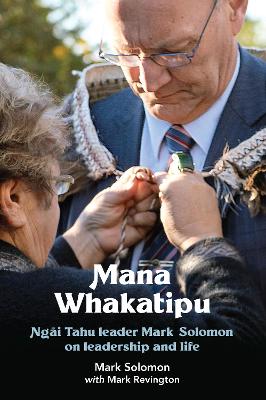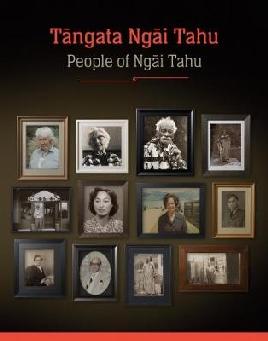In 1998, on the eve of Ngāi Tahu reaching settlement with the Crown, Mark Solomon stepped into the role of Kaiwhakahaere (Chair) of the iwi’s governing council, Te Rūnanga o Ngāi Tahu. At midday, I tuned into a livestream from The Piano to hear Tā Mark kōrero with Nic Low (WORD Christchurch Festival co-director).
Tā Mark spoke about his Ngāi Tahu and Ngāti Kurī whakapapa and his whānau in Kaikōura. When his grandmother died in 1977, he went home and was asked by uncles to "dig our mother's grave". He stepped up to this important role. Since then, he helped bury 26 of his family in the urupa.
He learned a lot from whānau. There were relatives who shared whakapapa with him, one with 14 school exercise books full of data, and pages and pages of information.
A Whakapapa of Leadership
Mark spoke of Rangi Solomon, his grandfather, as "the most human human being I've known". Tā Tipene O'Regan called Rangi the tribal strategist. Rangi would be quiet, and then would lay it all out at the end of meeting. Trevor Hapi Howse - known as "the Weka" - took Mark to his first hui with him 1988, and advised him to just stand against back wall and watch. He noticed one of the old ladies would come through side door, take someone away, then they'd come back to the hui and ask a question.
Those old ladies dictate what happen. You need them on your side.
Mark was elected as the representative of Te Rūnanga o Kaikōura in 1995. His first meeting with Te Rūnanga o Ngāi Tahu was at Taumutu:
“The first person to walk up to me there was George Tikao. He introduced himself and said, ‘You know, we are close relations. It is an honour to have you with me – sit at the table beside me.’ I was also told that day by Cath Brown and Ruahine Crofts that they were my mentors, and that they would look after me. That was my first meeting,” he says. (from Walking the Talk)
Nic spoke of Mark's real whakapapa of leadership, and asked: Did you feel ready for role of Kaiwhakahaere (Chair)? No, it was a series of accidents. Mark was nominated on the day and didn't get supported by own family, all but four voted for elder cousin. He got the vote of all the other families of Kaikōura. He was elected on Saturday, then on Monday was signing Ngāi Tahu treaty settlement papers.
Ngāi Tahu Treaty Settlement
In his book, he talks about the day of the signing of the Ngāi Tahu Settlement in September 1998:
Outside the Grand Hall of Parliament, there were television crews and more than a hundred people waiting to be welcomed. As Ngāi Tahu kaiwhakahaere, it was my job to deliver the whaikōrero on behalf of Ngāi Tahu, but my grasp of te reo Māori was basic at best. I’d never been a public person and I was terrified.
I stammered through the pōwhiri, and afterwards I realised that I hadn’t acknowledged all the rangatira from other tribes who had come to tautoko us, support us. I was hugely embarrassed.
When I went to explain, I found them all standing together.
“Uncle,” I said to Api Mahuika, the leader of Ngāti Porou. “I’ve come to apologise for not acknowledging you being here to support Ngāi Tahu.”
Api looked at me with a big smile on his face and said, “Oh, boy. We could see the tūtae running down the back of your legs.”
He had forgiven me.
Tā Tipene's wife Sandra invited Mark and his wife Maria over to dinner after he became Kaiwhakahaere:
"You need to know what he's got you into. I am telling you this job totally consumes. You need to know you are now a solo mother."
This was no exaggeration. In his 18 years at the helm, he worked 42 weekends a year.
The Business world
Tā Mark was keen on plain speaking, even in the jargon filled business world. "Talk to us, not at us, Keep the language simple." For someone who didn't start out as a natural public speaker, Tā Mark learned a lot. Obama's speeches were written to a 12 year old's language level, and Mark wanted to be clear too, keeping a speech to bullet points and then:
"I will speak to the bullet points out of my heart ...Keep things simple and everyone understands."
Christchurch and Kaikōura earthquakes
Tā Mark spoked about the phenomenal Ngāi Tahu response to both natural disasters. The response was one of aroha for everyone. There were 10,000 door knocks by wardens. Doctors and nurses came down from Tainui and Te Aroha and other places. A trailer of medical supplies was used in that first day in the Eastern suburbs. The CDHB asked them to leave, but at the prospect of Tā Mark appearing on the news, two hours later the Board restocked the trailer. Data was documented. At one door knocked on. a nurse found a skinhead with a swastika tattoo looking after his Māori neighbour with colostomy bag:
We all become immediately equal. We're all called victims.
Is it a disaster now with Covid? There are discrepancies, Mark says, the higher death rate for Māori, and that 47% of those with Covid are Māori.
How are we doing as a city?
Pretty good. They said recovery would take 10 to 20 years. I like the lowering of heights in the central city. I'm looking forward to when we start all the planting.
NZ media
Tā Mark talked about how in Aotearoa we take a deficit approach. $1.4 million was spent prosecuting 38 women - accused of shoplifting $700 of goods.
He called former Press editor Tim Pankhurst to task for blaming whole race for actions of an individual.
As a keynote speaker at an editors' conference, he questioned how the media subjected Tainui to 15 month public humiliation for losing $43 million, and a time when Ansett and Air New Zealand were being bailed out to the tune of many more millions of dollars.
Family Violence and Sexual Abuse
Tā Mark is concerned with violence in New Zealand society. It is male driven. There are 2500 family violence callouts per month in Christchurch.
Teaching history in schools
The majority of us have no idea what the history of our country is. Everybody thought the Waitangi Tribunal was a free process. It cost $20 million for Ngāi Tahu to reach a settlement:
I will never state in every forum that the Ngāi Tahu settlement was fair and just.
The Crown reckoned full redress was worth around $12 to $15 billion. Our advisers thought it was closer to $20 billion. We settled for $170 million — a lot less, but it allowed Ngāi Tahu to move forward, to rebuild.
(from Mark Solomon: On leadership and life excerpt from Mark's book on E-Tangata)
Kia ora Tā Mark and Nic for a full and fascinating session.
Recommended resources
- Mana Whakatipu: Ngāi Tahu Leader Mark Solomon on Leadership and Life Mark Solomon with Mark Revington
- The wisdom of Solomon: Tā Mark's post-Ngāi Tahu journey Philip Matthews, The Press
- Tā Mark Solomon - leadership and life RNZ
- Mark Solomon: On leadership and life (excerpt from Mark's book on E-Tangata)
- Ngāi Tahu website
- Kā Huru Manu a project dedicated to creating a Ngāi Tahu atlas of place names and histories
- The Ngai Tahu Report, 1991 Waitangi Tribunal.
- Te Kerēme Index to the Ngāi Tahu Land Claim from Christchurch City Libraries
- Te Maire Tau. Ngāi Tahu - The Ngāi Tahu claim, Te Ara - the Encyclopedia of New Zealand
Find in our collection:
WORD Christchurch
- WORD Christchurch website (for the full programme and info about authors)
- Our pages about WORD Christchurch and WORD Christchurch Festival 2021
- Follow WORD on Twitter, Facebook, and Instagram









Add a comment to: Mark Solomon: Mana Whakatipu: WORD Christchurch Festival 2021